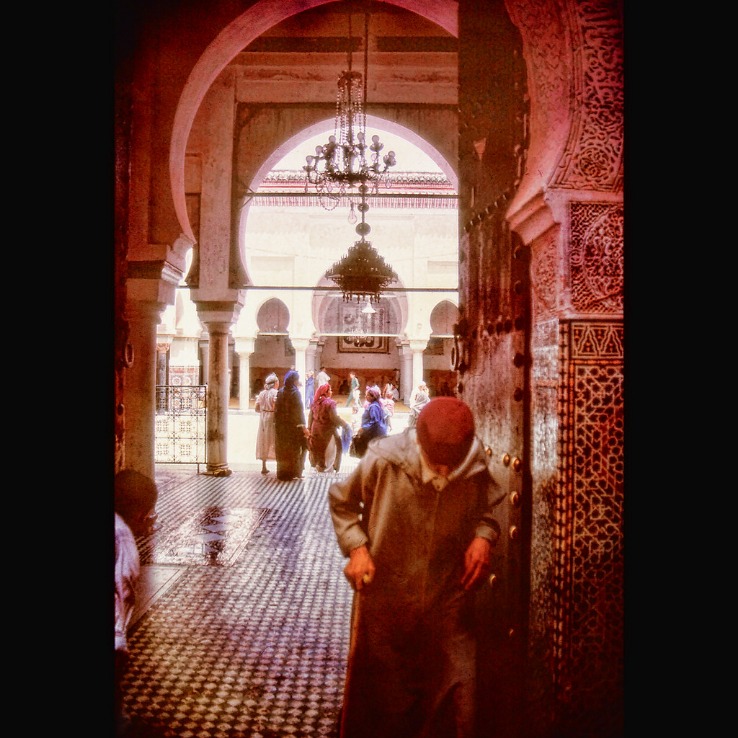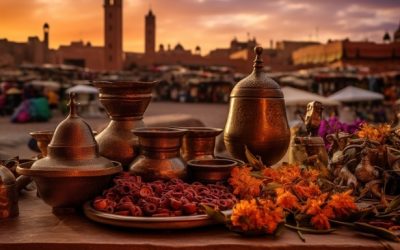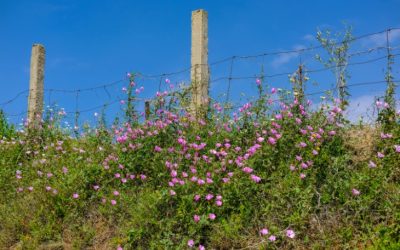History and Founding of Al Karaouine University
Al Karaouine University, located in Fes, Morocco, is renowned as one of the oldest and most significant centers of learning in the world. Founded in 859 AD, it has a rich history rooted in Islamic education and was established by Fatima al-Fihri, a pioneering woman dedicated to the pursuit of knowledge. Over the centuries, Al Karaouine has evolved into a prestigious institution, combining religious studies with modern academia, and continues to be a symbol of Morocco’s longstanding tradition of scholarship and cultural heritage.
Origins and Historical Significance
Al Karaouine University, located in Fez, Morocco, is renowned as one of the oldest and most prestigious higher educational institutions in the world. Founded in 859 AD by Fatima al-Fihri, a pioneering Muslim woman, it began as a small madrasa dedicated to religious and theological studies. Over centuries, it evolved into a comprehensive university, attracting scholars from across the Islamic world and beyond. Its establishment marked a significant milestone in the history of education, serving as a center for learning, intellectual development, and cultural preservation in Morocco and the broader Muslim world.
Throughout its history, Al Karaouine has played a pivotal role in the transmission of knowledge, particularly during the Islamic Golden Age. The university became a hub for scientific, religious, philosophical, and literary advancements, contributing to various fields such as mathematics, astronomy, medicine, and Islamic jurisprudence. Its extensive library and scholarly community fostered an environment of academic excellence and innovation. The institution’s influence extended beyond Morocco, shaping educational standards and scholarly pursuits across the Arab and Muslim worlds.
Today, Al Karaouine University holds the distinction of being recognized by UNESCO and the Guinness World Records as the oldest continuously operating degree-granting university. Its historical significance lies not only in its age but also in its enduring contribution to the preservation and dissemination of knowledge. As a symbol of Morocco’s rich cultural and educational heritage, Al Karaouine remains a vital institution that continues to inspire scholars and students worldwide.
Founders and Early Development
Al Karaouine University, located in Fez, Morocco, is recognized as one of the oldest continuously operating higher educational institutions in the world. It was founded in 859 AD by Fatima al-Fihri, a remarkable woman dedicated to the pursuit of knowledge and religious education. The university began as a madrasa or religious school, primarily focusing on Islamic studies, mathematics, astronomy, and philosophy, reflecting the rich intellectual tradition of the Islamic Golden Age.
Initially established as a modest mosque and educational institution, Al Karaouine quickly gained prominence due to its scholarly curriculum and the support of local patrons. Over the centuries, it expanded its facilities and course offerings, becoming a renowned center for learning and cultural exchange across the Islamic world and beyond. The university played a significant role in fostering scientific, theological, and literary traditions in Morocco and North Africa.
Throughout its early development, Al Karaouine attracted scholars and students from various regions, contributing significantly to the intellectual and spiritual life of Morocco. Its influence extended beyond religious instruction to include many disciplines, making it a comprehensive university long before the formalization of modern universities. Its legacy as a pioneering institution of higher education endures, symbolizing Morocco’s historical commitment to knowledge and cultural identity.
Major Milestones in the University’s Evolution
Al Karaouine University, located in Fez, Morocco, is widely recognized as one of the oldest continuously operating educational institutions in the world. Founded in 859 AD by Fatima al-Fihri, a visionary woman dedicated to religious and scholarly pursuits, the university initially served as a madrasa for Islamic studies and religious sciences.
Throughout its history, Al Karaouine has played a pivotal role in the Islamic and broader academic world, fostering scholars, scientists, and theologians. In the 12th century, it gained prominence under the Marinid dynasty, which expanded its facilities and academic programs, solidifying its reputation as a leading center of learning in Africa and the Arab world.
The university experienced periods of renewal and growth during different Islamic dynasties, including the Saadian and Alaouite rulers, who invested in its infrastructure and scholarly activities. In the 20th century, Al Karaouine integrated modern sciences alongside traditional Islamic studies, broadening its academic scope.
Major milestones in its evolution include the formal recognition by Moroccan authorities as a university in the 20th century, the establishment of a broader curriculum, and its designation as a UNESCO World Heritage site in 1981. Today, Al Karaouine remains a key symbol of Morocco’s rich educational and religious heritage, continuing its tradition of scholarly excellence and cultural significance.
Academic Programs and Curriculum
Al Karaouine University in Morocco offers a rich and diverse array of academic programs and curricula that reflect its historical significance as one of the world’s oldest institutions of higher learning. The university provides a comprehensive educational experience, combining traditional Islamic studies with modern disciplines to foster a well-rounded education. Its curriculum emphasizes scholarly excellence, cultural heritage, and the development of critical thinking skills among students from around the globe.
Islamic Studies and Religious Sciences
Al Karaouine University in Morocco is renowned for its rich academic programs in Islamic Studies and Religious Sciences, offering students a comprehensive understanding of Islamic theology, jurisprudence, and culture. Its curriculum is designed to blend traditional Islamic scholarship with modern academic approaches, fostering a deep appreciation for religious sciences along with contemporary subjects.
- Core Subjects: The university’s curriculum includes Quranic studies, Hadith, Fiqh (Islamic jurisprudence), Tafsir (Quranic exegesis), and Islamic philosophy.
- Historical and Cultural Studies: Courses on Islamic history, Moroccan heritage, and the Arab and Muslim world are integral parts of the program.
- Language and Textual Analysis: Emphasis is placed on learning classical Arabic, the language of Islamic texts, along with other languages relevant to Islamic scholarship.
- Modern Integrations: The curriculum incorporates contemporary subjects such as ethics, social sciences, and interfaith dialogue to prepare students for engaging with modern societal issues.
- Research and Diploma Programs: Advanced research initiatives and specialized diploma programs enable students to contribute to scholarly discourse in Islamic sciences.
Legal and Jurisprudence Courses
Al Karaouine University in Morocco offers a comprehensive academic program focused on providing a deep understanding of legal and jurisprudence courses. The curriculum is designed to blend traditional Islamic legal studies with modern legal principles, ensuring students gain both historical and contemporary perspectives on law. The legal courses cover a wide range of subjects including Islamic law (Fiqh), comparative law, legal theory, and jurisprudence, enabling students to develop a robust comprehension of both religious and civil legal systems.
Students pursuing legal and jurisprudence courses at Al Karaouine are engaged in rigorous analysis of classical texts as well as contemporary legal issues. The curriculum emphasizes critical thinking, interpretation of Islamic legal sources, and application of jurisprudential principles to modern societal challenges. Additionally, the program fosters appreciation for the cultural and religious heritage of Morocco, integrating traditional legal scholarship with modern legal frameworks to prepare graduates for diverse roles in legal practice, academia, and religious leadership.
Other Disciplines and Modern Programs
Al Karaouine University in Morocco offers a diverse range of academic programs and curricula designed to balance traditional Islamic studies with modern disciplines. The institution emphasizes integrating classical scholarship with contemporary education to prepare students for various professional fields.
Within its academic offerings, Al Karaouine provides programs in:
- Islamic sciences, including theology, jurisprudence, and Arabic language studies
- Modern disciplines such as law, education, and social sciences
- Technical fields like information technology and engineering
- Humanities and cultural studies, encompassing history and literature
Other disciplines and modern programs are continuously developed to adapt to changing academic trends and societal needs. The university encourages research and innovation, fostering a multidisciplinary environment where tradition and modernity coexist seamlessly. This approach ensures graduates are well-equipped with both classical knowledge and skills relevant to today’s global challenges.
Architectural and Cultural Heritage
Al Karaouine University in Morocco stands as a remarkable testament to the country’s rich architectural and cultural heritage. Founded in the 9th century, it is recognized as one of the oldest universities in the world, embodying centuries of scholarly and spiritual tradition. The university’s intricate design and historical significance reflect the vibrant history of Islamic architecture and Moroccan cultural identity, making it a vital symbol of intellectual and cultural continuity in the region.
Historical Structures and Significance
Al Karaouine University in Morocco is a remarkable example of architectural and cultural heritage that highlights the rich history of Islamic scholarship and educational tradition. Founded in 859 AD, it not only served as one of the world’s earliest universities but also as a center for learning, research, and religious studies, reflecting the deep cultural significance of the region.
The architecture of Al Karaouine is characterized by its intricate design, traditional Islamic motifs, and centuries-old structures that have been preserved and restored over time. The university’s courtyards, minarets, and prayer halls exemplify the Moorish architectural style, showcasing skillful craftsmanship and artistic detail that have stood the test of time.
This historical structure is highly significant culturally as it symbolizes Morocco’s heritage as a hub of knowledge, faith, and cultural exchange. Al Karaouine’s influence extended beyond Morocco, impacting Islamic education and scholarly pursuits throughout the Muslim world, thereby asserting its importance as a UNESCO World Heritage site.
Preservation and Renovation Efforts
Al Quaraouiyine University in Morocco stands as a remarkable example of architectural and cultural heritage, reflecting centuries of Islamic scholarship and Moroccan craftsmanship. Preserving this historic institution involves protected renovation efforts that honor its original design while incorporating modern techniques to ensure its longevity. Renovation projects focus on restoring intricate tile work, ancient wooden ceilings, and the historic mosque structures, maintaining their authenticity and cultural significance. These preservation initiatives are vital in safeguarding the university’s unique identity amidst urban development pressures, allowing future generations to appreciate its architectural grandeur and historical importance. Continuous efforts in restoration and preservation affirm Al Quaraouiyine’s status as a UNESCO World Heritage site, serving as a beacon of Morocco’s rich cultural and educational legacy.
Role in Moroccan Education and Society
Al Quaraouiyine University holds a central place in Moroccan education and society, standing as one of the oldest and most esteemed institutions of learning in the world. Established in the 9th century, it has historically served as a center for religious, cultural, and scholarly pursuits, reflecting Morocco’s rich heritage. The university not only contributes to the intellectual development of future generations but also plays a vital role in preserving the country’s traditions and fostering social cohesion across Moroccan society.
Influence on Moroccan Culture and Identity
Al Karaouine University in Morocco plays a pivotal role in shaping the educational landscape and cultural identity of the country. As one of the world’s oldest universities, it has historically been a center for Islamic scholarship, religious studies, and traditional sciences, influencing generations of students and scholars within Morocco and beyond. The university fosters a deep sense of national pride and cultural continuity, serving as a symbol of Morocco’s rich intellectual heritage.
Through its centuries-long history, Al Karaouine has contributed significantly to the development of Moroccan society by promoting education, religious cohesion, and cultural preservation. Its influence extends beyond academia, impacting societal norms, values, and the collective identity of Moroccans by acting as a guardian of religious and cultural traditions.
The university has also played a crucial role in shaping Moroccan culture by integrating Islamic teachings with local customs, thereby forming a unique cultural identity. It continues to be a vital institution that reflects Morocco’s historical openness to learning, religious scholarship, and cultural diversity, reinforcing the nation’s place within the broader Islamic and global intellectual communities.
Notable Alumni and Contributions
Al Karaouine University in Morocco holds a prestigious position as one of the oldest and most influential educational institutions in the world, playing a vital role in shaping Moroccan society and culture. It has historically been a center for religious, philosophical, and scientific learning, fostering a deep sense of intellectual tradition and community cohesion. The university’s role extends beyond education, as it has contributed significantly to the development of Moroccan identity and the preservation of Islamic knowledge throughout centuries.
Notable alumni of Al Karaouine include scholars, theologians, and leaders who have made significant contributions in various fields. Many graduates have become prominent religious authorities, influential thinkers, and educators across Morocco and the wider Muslim world. The university has also been instrumental in producing scholars who have impacted fields such as mathematics, astronomy, law, and literature, reflecting its rich academic heritage.
The contributions of Al Karaouine alumni have been crucial in advancing knowledge, fostering intercultural dialogue, and supporting social development in Morocco. Its legacy of scholarly excellence continues to influence contemporary education and religious thought, reinforcing its reputation as a beacon of learning and cultural heritage in Morocco and beyond.
Global Recognition and UNESCO Heritage Status
Al Karaouine University in Morocco is a distinguished institution renowned for its historical significance and educational excellence. Recognized internationally, it has earned prestigious honors such as UNESCO World Heritage Status, highlighting its cultural and academic importance. This recognition not only emphasizes its enduring legacy but also underscores the university’s role in fostering knowledge and preserving Islamic and Moroccan heritage for future generations.
World Heritage Designation
Al Karaouine University in Morocco holds a distinguished place in global cultural and educational history, being recognized as one of the world’s oldest universities. Its designation as a UNESCO World Heritage Site emphasizes its significance as a cultural and historical landmark, preserving centuries of Islamic scholarly tradition and architectural heritage. The World Heritage status not only acknowledges its importance for Morocco but also highlights its value to humanity’s collective cultural patrimony. This recognition helps promote international awareness, protection, and conservation efforts to ensure that Al Karaouine’s rich legacy remains intact for future generations.
Impact on International Scholarship and Dialogue
Al Karaouine University in Morocco has achieved significant recognition on the global stage through its UNESCO World Heritage status, highlighting its historical and cultural importance. This designation not only honors its centuries-old tradition of Islamic scholarship but also elevates its profile as a center of learning and cultural exchange. Such recognition fosters increased international interest, facilitating scholarly research and collaboration across borders. It underscores the university’s role in preserving Islamic and Moroccan heritage while promoting educational excellence.
- Enhances international visibility and attractiveness to students and researchers worldwide.
- Encourages cross-cultural dialogue and exchange of ideas among diverse academic communities.
- Stimulates global scholarship focused on Islamic studies, medieval history, and cultural preservation.
- Supports diplomatic and cultural initiatives that strengthen Morocco’s position as a hub of intercultural understanding.
Overall, UNESCO Heritage Status for Al Karaouine University acts as a catalyst for fostering international dialogue, advancing scholarly efforts, and promoting mutual understanding among nations through the shared appreciation of its rich educational legacy.
Research and Publications
Al Karaouine University in Morocco is renowned for its rich history of research and scholarly contributions. As one of the oldest universities in the world, it has a longstanding tradition of fostering innovative research and publishing influential academic works across various disciplines. The institution continues to play a vital role in advancing knowledge and promoting intellectual development within the region and beyond.
Academic Journals and Contributions
Al Karaouine University in Morocco, widely recognized as one of the oldest institutions of higher learning, has made significant contributions to research and academic publications over centuries. Its rich historical legacy has fostered an environment of scholarly activity across diverse disciplines, including Islamic studies, law, astronomy, and linguistics. The university’s faculty members and researchers continually publish articles and papers in reputable academic journals, enhancing global knowledge and understanding of Moroccan culture, history, and scientific advancements.
Through dedicated research efforts, Al Karaouine University has contributed valuable insights into Islamic philosophy, regional history, and contemporary issues. Its academic journals serve as platforms for scholars worldwide to share innovative findings and collaborate on interdisciplinary projects. The university’s emphasis on preserving traditional knowledge while embracing modern research methodologies positions it as a vital center for scholarly excellence in North Africa and beyond.
Moreover, the contributions made by its faculty and students have significantly impacted the academic community, fostering cross-cultural dialogues and promoting academic development in Morocco and the wider Islamic world. Continued commitment to research and publication cements Al Karaouine’s reputation as a pivotal institution that bridges historical heritage with contemporary scientific inquiry.
Notable Research Initiatives
Al Karaouine University in Morocco is renowned not only as one of the oldest educational institutions in the world but also for its significant contributions to research and scholarship over centuries. The university has historically been a center for Islamic studies, philosophy, theology, and social sciences, fostering a rich intellectual tradition.
Notable research initiatives at Al Karaouine include pioneering studies in Islamic jurisprudence, historical research on North African civilization, and language preservation efforts. The university has collaborated with international academic bodies to promote the study of Arabic language and literature, contributing valuable resources and scholarly publications. In recent years, efforts have been made to integrate modern research methodologies into traditional fields, resulting in innovative projects that bridge historical knowledge with contemporary issues.
Al Karaouine University also hosts conferences, seminars, and workshops aimed at advancing scholarly discourse in various disciplines. Its research output is reflected in numerous publications, articles, and books that continue to influence Islamic studies, Moroccan history, and broader cultural studies. As a historic hub of knowledge, the university remains a vital contributor to regional and global academic communities.
Current Challenges and Future Prospects
Al Karaouine University in Morocco stands as a historic beacon of knowledge and cultural heritage, facing numerous contemporary challenges while also holding promising prospects for the future. In an era marked by rapid technological advancement and globalization, the institution strives to maintain its academic traditions while adapting to new educational paradigms. Exploring these current hurdles and the potential opportunities ahead provides insight into the evolving landscape of this renowned center of learning.
Modernization and Technological Integration
Al Karaouine University in Morocco faces numerous current challenges as it strives to balance its rich historical legacy with modern educational demands. Preservation of its ancient structures and traditions often conflicts with the need for technological advancement, creating tension between heritage conservation and modernization efforts.
Despite these obstacles, the university shows promising prospects for future development through innovative integration of technology and educational practices. Embracing digital tools can enhance research, facilitate global collaboration, and modernize teaching methods, ensuring the institution remains relevant in contemporary education contexts.
- Modernization of Infrastructure: Upgrading facilities to incorporate digital classrooms, laboratories, and resource centers
- Technological Integration: Implementing e-learning platforms, online libraries, and digital archives for broader accessibility
- Curriculum Development: Incorporating new fields such as computer science, engineering, and modern sciences alongside traditional studies
- Faculty Training: Providing training for educators to effectively use new technologies and pedagogies
- Preservation and Innovation: Balancing the conservation of historical heritage with the integration of modern architectural and educational innovations
- International Collaboration: Strengthening partnerships with global institutions to foster exchange programs, joint research, and knowledge sharing
Preservation Amid Urban Development
Al Karaouine University in Morocco faces significant challenges in balancing the preservation of its rich historical and cultural heritage with the demands of modern urban development. As urban areas expand rapidly, there is pressure to modernize surrounding infrastructure, which can threaten the integrity of the ancient structures and the traditional academic environment. Preservation efforts often struggle to keep pace with development projects, risking the loss of invaluable architectural and cultural assets that define the university’s unique identity.
However, there are promising prospects for the future of Al Karaouine. Increased awareness of its historical significance has led to initiatives aimed at integrating conservation with urban planning. Modern technologies such as digital documentation, restoration techniques, and sustainable development practices offer new ways to preserve the university’s heritage while supporting urban growth. Strengthening collaboration between government authorities, heritage organizations, and local communities is crucial to ensuring that Al Karaouine remains a living symbol of Morocco’s educational and cultural legacy amidst the evolving urban landscape.





0 Comments